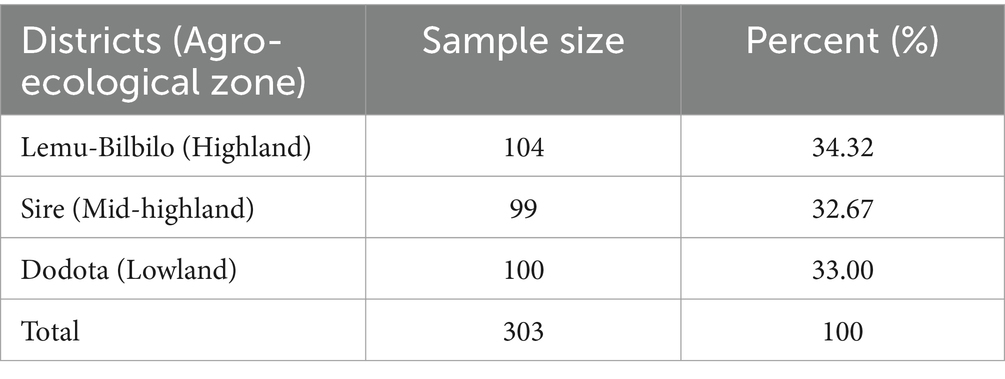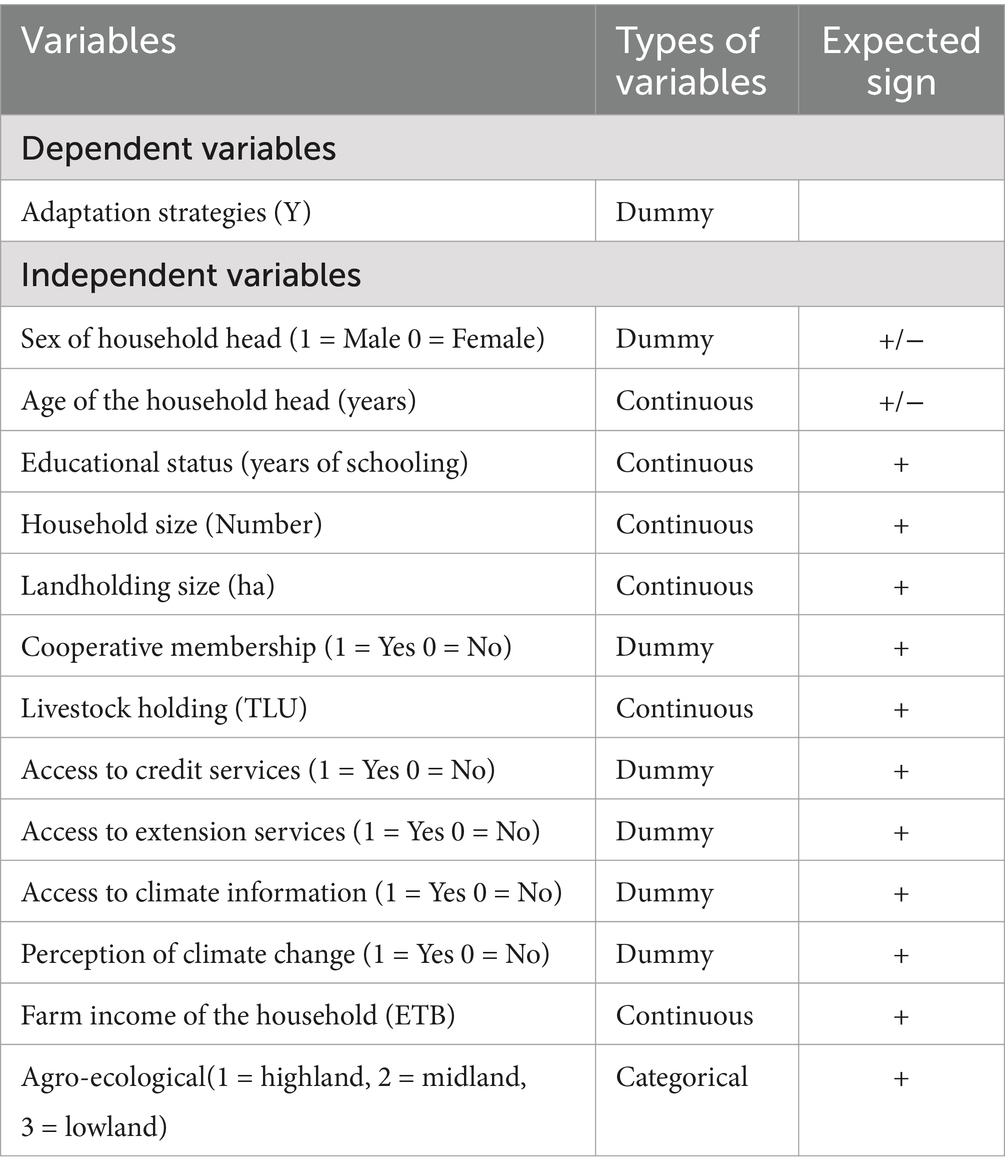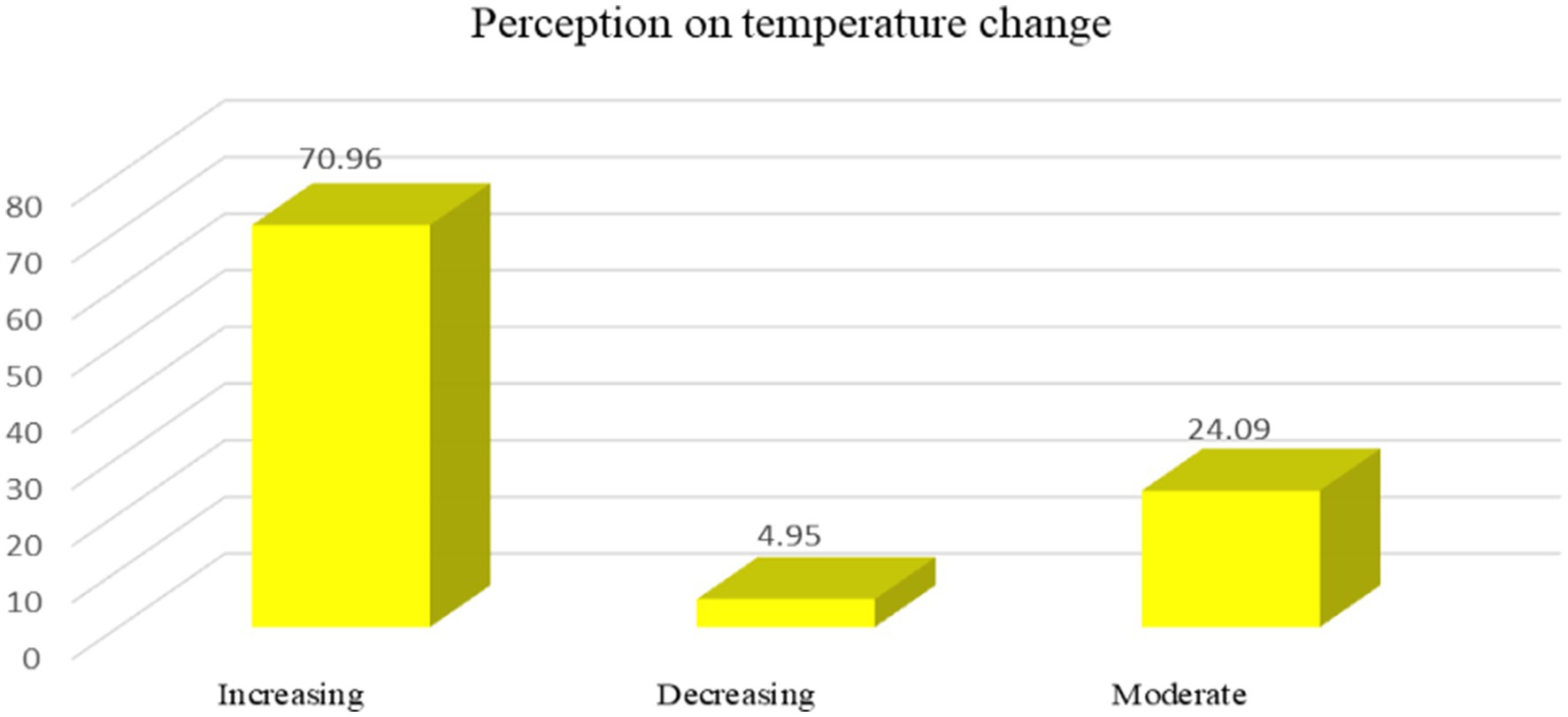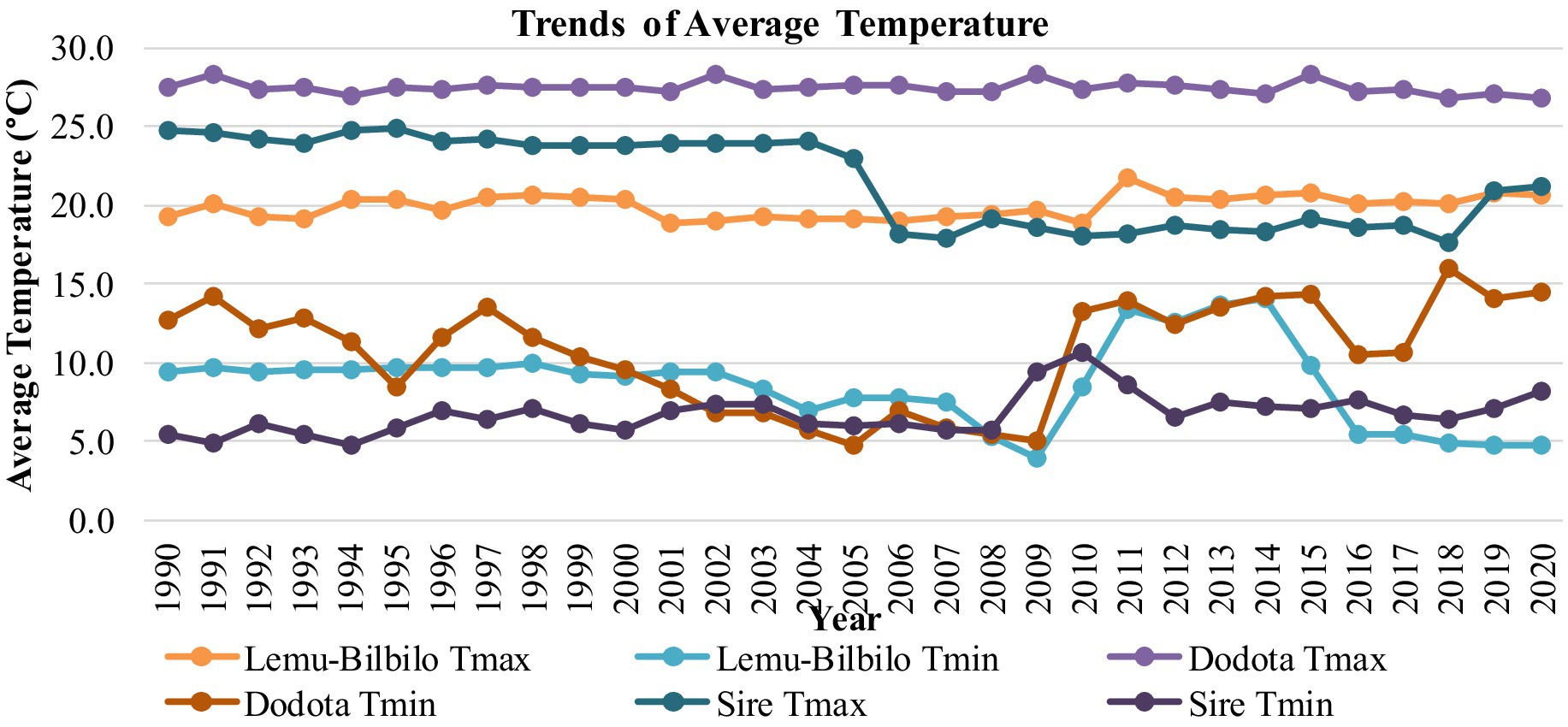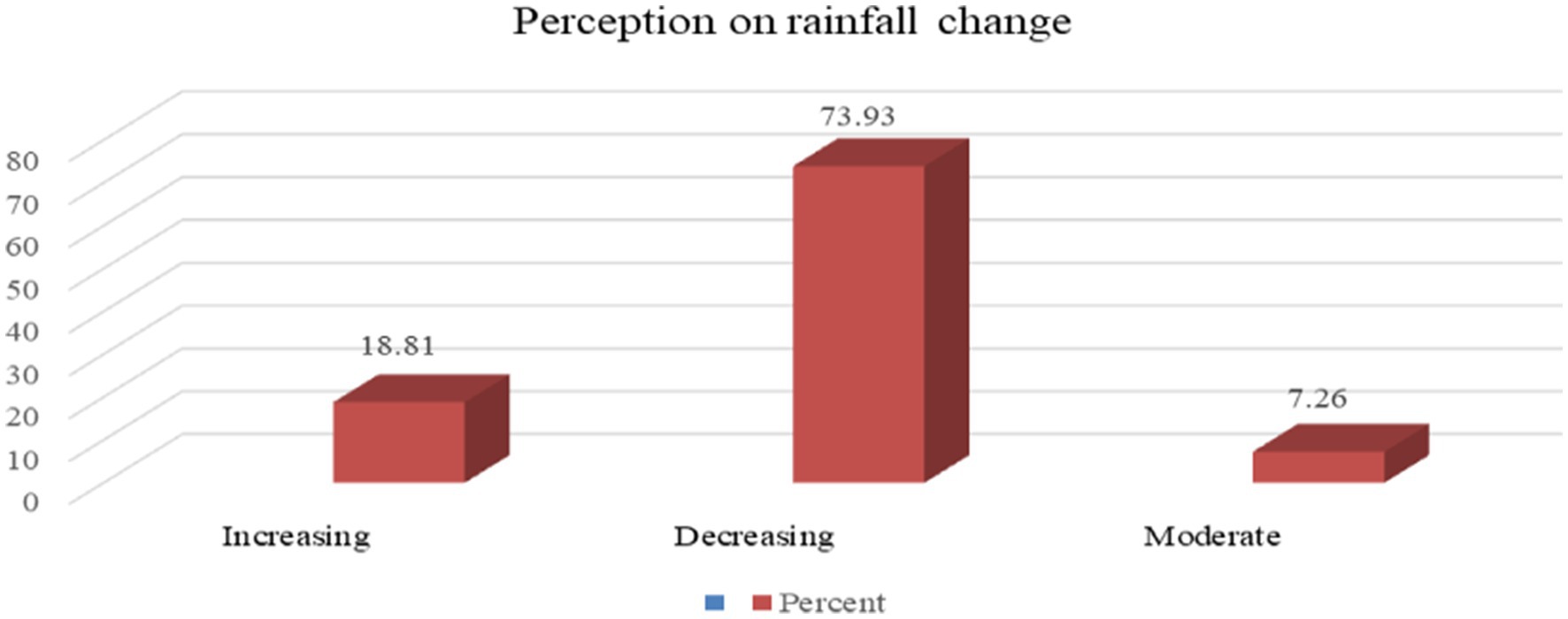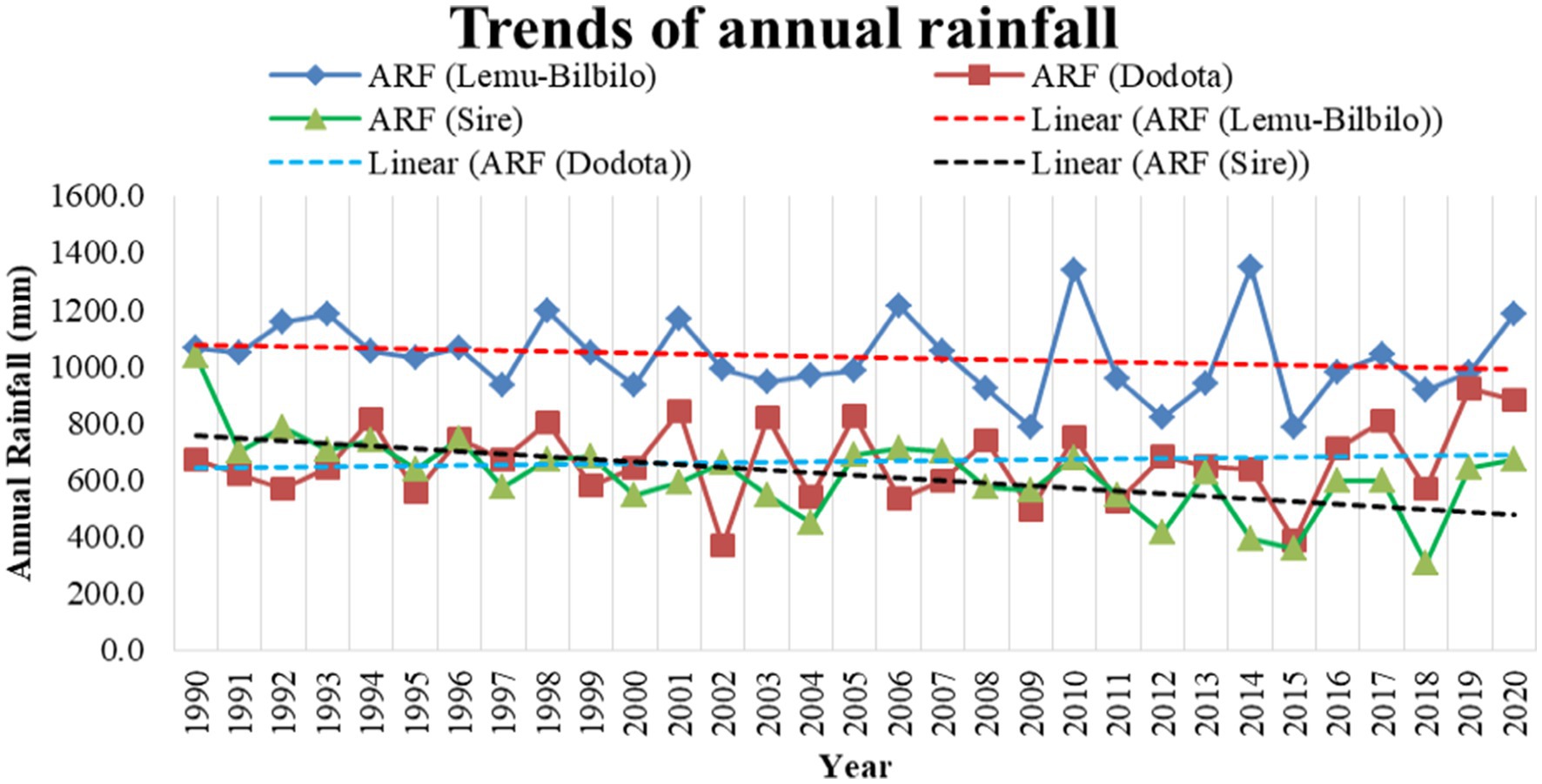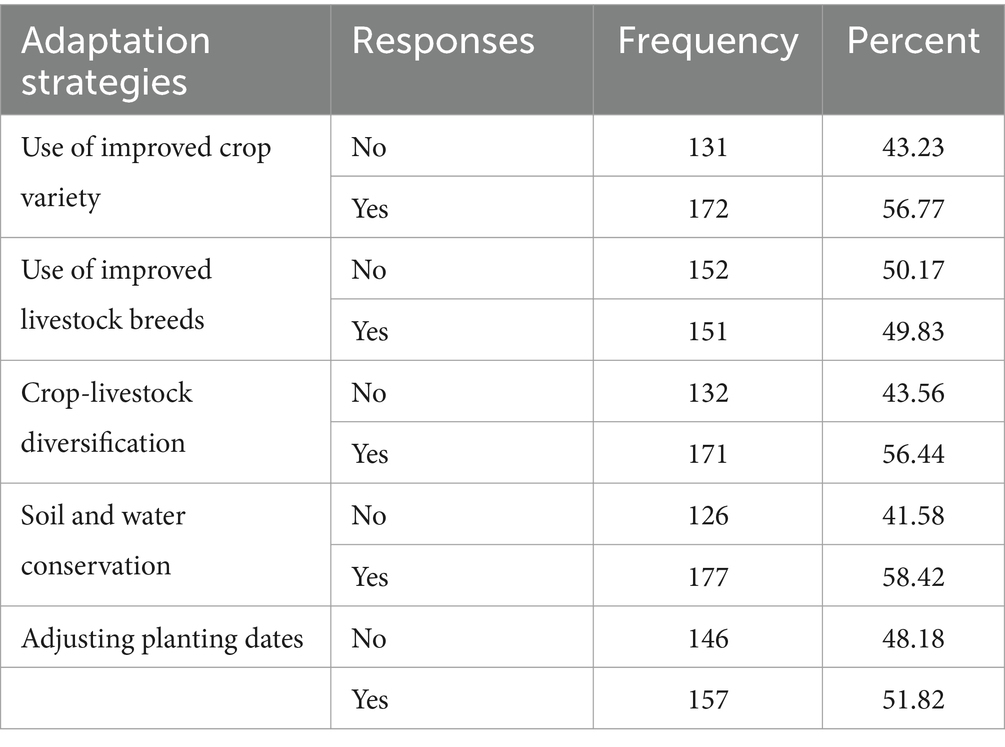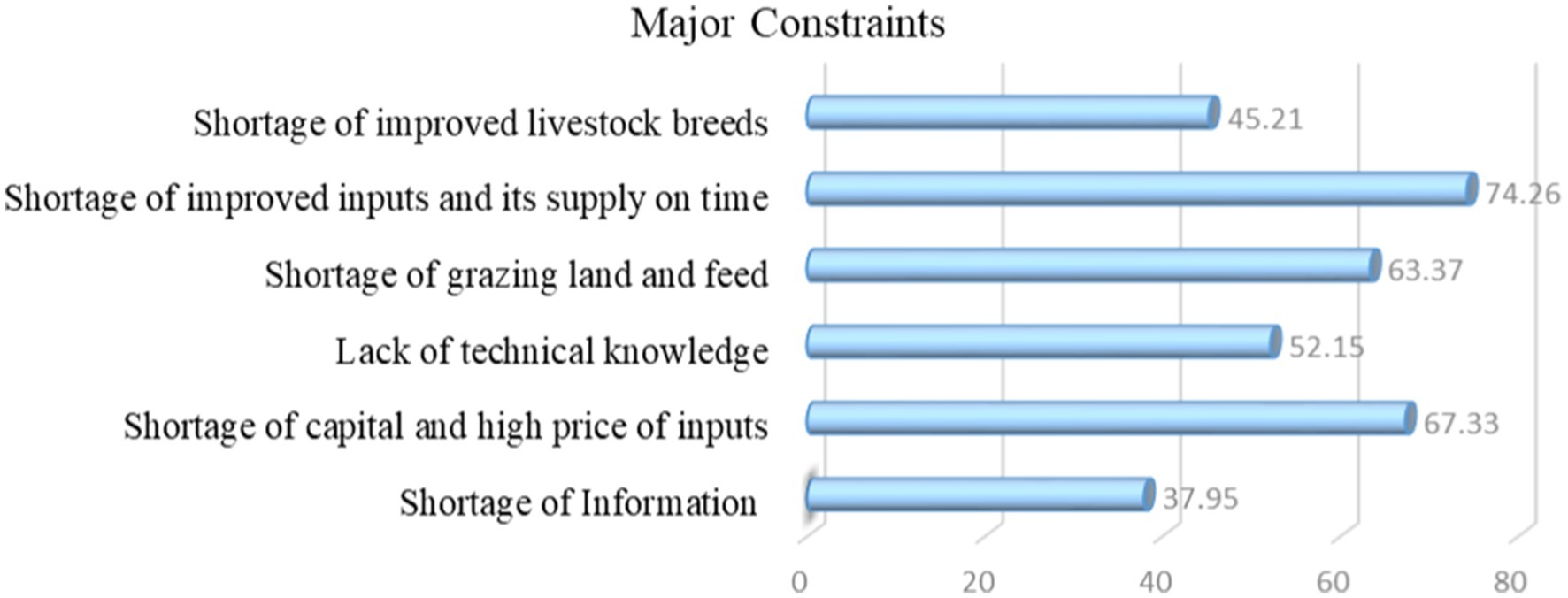- Oromia Agricultural Research Institute, Asella Agricultural Engineering Research Center Socioeconomics Research Team, Asella, Ethiopia
Climate change has a greater influence on agricultural production due to the effects of floods, droughts, and crop pests. The objective of the study was to explore farmers’ perceptions of climate change, adaptation strategies, constraints to adaptation strategies, and identify factors affecting the choice of climate change that affect adaptation strategies for agricultural production. Data was collected from 303 households selected using a multistage sampling technique to collect data using structured questionnaires. Descriptive statistics, Mann–Kendall statistical test, the weighted average index, and a multivariate probit model were used. The result shows that farmers used multiple adaptation strategies, mostly improved varieties, improved livestock, and mixed farming. Farmers’ choices of adaptation strategies were affected by education, household size, cooperative membership, extension services, climate information, perception of climate change, and farm income. Thus, efforts to create awareness about climate change through mass media, extension services, and enabling cooperative unions are essential.
Introduction
Climate change is hurriedly evolving as the greatest challenging ecological problem influencing numerous sectors, mostly in agriculturally dependent countries (Fadina and Barjolle, 2018). It influences the most marginalized societies with limited access to resources and potentials to deal with changing weather patterns (FAO, 2019). Due to the overdependence of economies on climate-sensitive sectors, Sub-Saharan Africa is chiefly vulnerable to climate change (AGRA, 2018). The majority of developing countries, expressly those in Africa, rely mostly on rain-fed agriculture for their food, making them particularly vulnerable to the adverse effects of climate change (Evariste et al., 2018; Serdeczny et al., 2017).
In Ethiopia, the impact of climate change is more severe because more than 85% of the country’s population is dependent on agriculture as a source of livelihood (Ayal and Filho, 2017). Increased climatic variability (changing rainfall patterns, increased temperature, and lower precipitation), drought, flooding, shortage of water, and increased incidence of pests and diseases like the spread of cereal stem borers lead to greater instability in agricultural production and are responsible for low productivity as well as limiting options for coping with adverse weather conditions for farmers (Asrat and Simane, 2018). Due to that, the Ethiopian government has launched the Climate-Resilient Green Economy (CRGE) program to shield the nation from the adverse influences of climate change as well as to develop a green economy that will help Ethiopia accomplish its objective of becoming a middle-income nation by 2025. One of the pillars of CRGE is enhancing agricultural production systems to achieve food security and raise farmers’ incomes to enhance resilient and adaptive systems to climate change (FDRE, 2011).
Climate change without adaptation is anticipated to impact the livelihoods of rural communities strongly (Kosec and Mo, 2017). Agriculture (both crop and livestock) production is affected by climate change in a number of ways (Workalemahu and Dawid, 2021). In fact, climate change and agriculture are interrelated because the output from climate change often becomes the input for agricultural processes, and vice versa (IPCC, 2014). In Ethiopia, farmers used adaptation strategies such as soil and water conservation practices, agroforestry, crop diversification, livestock diversification and use of cross-breeds, small-scale irrigation, and changing sowing dates (Belay et al., 2017).
Climate change adaptation has the potential to significantly contribute to reductions in negative impacts from changes in climatic conditions. Hence, adaptation measures are essential to help vulnerable societies to better face extreme weather conditions and associated climatic variations (Tesfaye and Seifu, 2016). A study in Ethiopia suggests that adaptation options are location-specific and that policy for adaptation options should be area-specific (Deressa et al., 2009). Besides, climate change adaptation strategy is not a one-size-fits-all condition and varies both spatially and temporarily based on agro-ecological contexts and existing infrastructural capacity (Adger et al., 2009). Farmers’ responses to climate change vary from place to place and among local smallholder farmers in order to maintain food security in the face of production losses aggravated by climate change (Bewket et al., 2015).
There are few studies on climate change perception and adaptation determinants in Ethiopia, such as smallholder farmers adaptation to climate change and determinants of their adaptation decisions in the Central Rift Valley of Ethiopia (Belay et al., 2017); smallholder farmers adaptation strategies to climate-related risk factors in wheat production in selected districts of central Oromia, Ethiopia (Zeray et al., 2017); and determinants of smallholder farmers adaptation to climate change and variability in Sire district of Arsi zone (Kasim and Feto, 2018) are empirical studies worth referencing. Those studies are somehow aggregated and failed to exactly indicate farmers’ adaptation strategies to climate change on agricultural production (both crop and livestock) and adaptation determinants in the Arsi zone. Although some efforts are exerted to examine farmers’ perceptions of climate change and framers’ choices of adaptation strategies to climate change in some parts of the country, empirical work is scanty in southeastern Ethiopia.
In the Arsi zone, farmers mainly suffer from climate change hazards and weather-related impacts. These are changes in rainfall distribution in the rainy seasons, hailstorms, crop disease and pests, livestock disease, floods, and high temperatures. In the study areas, most crops, especially wheat, barley, and potatoes, are affected by the weather conditions. Due to this, crop yield is affected by many factors associated with climate change, which include temperature, rainfall, and other extreme weather events. Similarly, livestock production is affected by many factors, such as a shortage of grazing land and feeding, a shortage of water, and different diseases that especially affect productive cattle. So from the foregoing, it becomes imperative that adequate adaptation strategies be explained to help cope with the challenges and impacts of climate change on agricultural production.
Despite the fact that farmers in the study area have responded to the adverse effects of climate change through a variety of adaptation strategies, there was insufficient empirical data to support the existing adaptation strategies used by smallholder farmers in the study area. Although farmers mostly apply strategies in combination with other strategies, previous studies failed to address this gap. There is, therefore, a need for a better understanding of farmers’ perceptions of climate change, adaptation strategies of climate change on agricultural production, constraints to adapt different adaptation strategies, and factors influencing farmers’ choice of a different set of climate adaptation strategies. Thus, this study intends to fill these knowledge gaps. Such empirical knowledge is critical for designing policies to tackle the challenges and strengthening farmers’ climate change adaptation capabilities.
Research methodology
Description of the study area
The study was carried out in Lemu-Bilbilo, Dodota, and Sire districts of the Arsi zone of the Oromia national regional state of Ethiopia. The zone is divided into 25 districts and one administrative town, Asella. The Arsi zone is located 175 km to the south-east of Addis Ababa, with a surface area of about 19,825.22 km2 (1,982,522 ha). The zone is divided into five agro-climatic zones, with moderately cool (40%) and cool (34%) annual temperatures. Similarly, the mean annual temperature of the zone ranges between 20°C - 25°C in the lowlands and 10°C - 15°C in the central highlands. Mixed farming systems, including rain-fed and irrigation, are common, but climate change has exaggerated agricultural production due to recurrent droughts and erratic rainfall (AZANRO (Arsi zone agriculture and natural resource office), 2021).
Data types, sources and methods of data collection
For this study, both primary and secondary data sources were used to collect qualitative and quantitative data at different levels. The data at the household level was collected through a household survey. A household survey was used to collect quantitative information from sample household heads who were the unit of analysis. The quantitative data were collected from sample households by using a semi-structured questionnaire. The qualitative data at the community level was collected through focus group discussions (FGDs), key informant interviews (KIIs), and observations. Three FGDs, which contained 8–10 individuals, were held to clarify issues not fully covered by the interview schedule and to obtain other supportive information for the study. The FGDs were purposively selected from model farmers, village leaders, and elders of society who had experience, knowledge, and information on climate change. Similarly, KIIs were held with experts, the head of the district agriculture office, and knowledgeable people from the community who have access to climate information regarding the dynamics of climatic parameters, the existing trend of climate change and its impacts, the response strategies so far practiced to adapt climate change, and constraints to the adaptation strategies in the area. Focus group discussions and key informants’ interviews were used to supplement and triangulate the data collected through structured interviews. On the other hand, secondary data were composed from different records of each District Office of Agriculture, Kebele administration offices, journals and other relevant sources. Moreover, the 31 years rainfall and temperature data for the period 1990–2020 have been collected from the National Meteorological Agency branch in Kulumsa Agricultural Research Center.
Sampling procedures and sample size
Multi-stage sampling procedures were used to select the study districts, kebeles, and households. In the first stage, the districts were classified into three strata based on the agro-ecological zones as highland, mid-highland, and lowland by using stratified sampling methods. Then, three districts (Lemu-Bilbilo, Sire, and Dodota) were selected randomly among stratified districts found in the zone (one from each agro-ecological zone). In the second, from the selected districts, four kebeles from each district were selected according to their agro-ecological zones. In the third stage, respondent farmers were selected randomly using simple random sampling from the sample frame of the study. Finally, a total of 303 sample respondents were selected (Table 1).
Methods of data analysis
Descriptive statistics, Likert scale measurement, the Mann-Kendall statistical test, the weighted average index, and an econometric model were used for data analysis. Descriptive statistics such as mean, frequency, percentage, graphs, and tables were used to recap adaptation strategies and constraints. Farmers’ perceptions of climate change were analyzed by using the Likert scale; further comparisons were made in correspondence with climate data recorded by Kulumsa sub-station for 31 years of temperature and rainfall by using the Mann-Kendall statistical test. The qualitative data collected from key informant interviews, focus group discussions, and observational notes was analyzed, recorded, categorized, and interpreted.
Farmers’ adaptation strategies to climate change on crop and livestock production were ranked using weighted average Indices using the formula (Kosgey, 2004):
In addition, a multivariate probit (MVP) model was employed to investigate the determinants that influence farmers’ choice of climate change adaptation strategies on agricultural production. The data was analyzed with STATA 17 software.
Specification of the econometric model
A multivariate probit (MVP) model was employed in this study to determine the factors that influence the selection of climate change adaptation strategies. Some recent empirical studies of technology adoption and climate change adaptation choices assume that farmers consider a set or bundle of possible technologies or adaptation strategies and choose a particular option that maximizes expected utility (Shiferaw, 2014). Because of this, adopting a decision is intrinsically multivariate, and attempting to employ univariate models ignores important economic information found in simultaneous and interdependent adoption decisions. Most smallholder farmers are more likely to adopt a combination of adaptation strategies to deal with a multitude of climate-induced risks and constraints than adopting a single strategy. Based on this argument, the study adopted a multivariate probit econometric technique to simultaneously model the influence of the set of explanatory variables on the choice of each of the different strategies while allowing the unobserved and/or unmeasured factors to be freely correlated. The correlation could be positive or negative between different strategies (Belderbos et al., 2004; Lin et al., 2005). Thus, we employed an MVP model in this study to investigate the interdependent adaptation strategies to climate change in the study area. According to Lin et al. (2005), in formulating the multivariate probit model such that as follows (Equation 2, 3):
Following Lin et al. (2005), the MVP model used for this study is specified as (Equation 4):
Hypothesized variables
Dependent variables: In this study, the major adaptation strategies, namely, improved crop varieties, improved livestock breeds, crop-livestock diversification (mixed farming), soil and water conservation practices, and adjusting planting dates, were selected. The choice of adaptation strategies is based on the actions the sample households take to counteract the adverse effects of climate change in the study area.
Independent variables: The hypothesized independent variables of the study are those that are expected to have an association with the use of adaptation strategies. They are presented in Table 2 and described briefly.
Results and discussion
Farmers’ perceptions of climate change
In the study areas, 73.60% of the sampled households perceived that climate change had changed, whereas 26.40% of the sampled households did not perceive climate change. This shows that most of the farmers understood or perceived climate change. Farmers perceive climate change commonly through changes in rainfall distributions and temperature. Temperature and rainfall parameters were used to describe farmers’ perceptions of climate change. This result is consistent with Belay (2020), who revealed that changes in rainfall distribution and high temperatures are the most common indicators of climate change. The farmers’ perceptions of climate change were measured as increasing, decreasing, and moderate. Hence, the majority of farmers responded that there had been a decrease in rainfall and an increase in temperature.
Perception of temperature changes and trend analysis
The result showed that 70.96% of the respondents perceived that there has been an increase in temperature in the past 31 years. About 4.95% of respondents also perceived that there was a decrease in temperature, while 24.09% recognized that there was no change in temperature (Figure 1). This result proved that most of the respondents recognized the increase in temperature. The result from the National Meteorological Agency (Kulumsa sub-station) data for the years 1990–2020 also supports that the trend of maximum temperatures in Lemu-Bilbilo and minimum temperatures in Dodota and Sire districts has increased (Figure 2). The increasing trends were observed for minimum temperatures except for the Lemu-Bilbilo district. In Sire district, the long-term temperature has less variability. The result showed significant increases in the minimum temperature.
Perception of rainfall changes and trend analysis
The result indicated that 73.93% of the respondents recognized that there is a decrease in rainfall patterns, 18.81% of the respondents supposed that there is an increase in rainfall availability, whereas the remaining 7.26% of the respondents perceived that there is no change in the availability of rainfall (Figure 3). The result of the study also assured that most of the farmers perceived a decrease in rainfall patterns in the study area. The changes include delaying and decreasing rainfall, early terminating, and raining during harvesting, as confirmed by FGDs.
The analysis of rainfall data over the past 31 years (1990–2020) from the NMA revealed a decreasing trend of annual rainfall in the study area (Figure 4). It showed that there was a problem of instability and volatility in the amount of annual rainfall in the districts. The meteorological record rainfall data of the study area verifies the perception of most farmers.
Farmers adaptation strategies to climate change
Adaptation to climate change is a two-step process that requires that farmers observe climate change in the first step and respond to changes in the second step through adaptation. According to the survey results, significant proportions of farmers have observed changes in climate over the past 31 years. To reduce the adverse influences of climate change and thereby maximize productivity, most smallholder farmers used several adaptation strategies. The usual adaptation strategies were the use of improved crop varieties, improved livestock breeds, crop-livestock diversification (mixed farming), soil and water conservation practices, and adjusting planting dates (Table 3).
These strategies are mostly used in combination with other strategies to safeguard against losses that could result from climate change. This result supports the findings of Belay et al. (2017) and Tanto and Laekemariam (2019).
Crop farmers’ adaptation strategies
Farmers used different adaptation choices against climate change in order to reduce the effects of climate change on crop production in the study area. Six best climate change adaptations were selected and prepared to be ranked by the respondents from the most preferred to the least preferred. These strategies, which include growing short-seasoned crops, crop rotation, early planting, drought-tolerant crops, agroforestry, and mulching, were selected based on previous literature. Hence, the results of the study revealed that among the crop adaptation strategies perceived by the farmers, crop rotation was ranked as the first most important climate change adaptation strategy, with a mean index value of 0.230 (Table 4). Crop rotation was the most preferable among the adaptation strategies because it maintains soil fertility and prevents soil from weeds, pests, and different crop diseases.
The second and third most preferred adaptation choices against climate change were planting drought-tolerant crops and mulching as a strategy to combat climate change, with mean index values of 0.177 and 0.160, respectively (Table 4). Planting drought-tolerant crops and mulching with crop residue is a very important strategy when there is a shortage of rainfall, especially in drought-prone areas, to cope with climate change. In the study area, smallholder farmers used mulching as a choice adaptation to combat climate change effects since it was easy to get mulching materials as they were locally available and most of them had local knowledge on how to use the strategy, and it could also be used as both a manure and soil conservation measure. As a result of soil cover by vegetation and residues, soil erosion through runoff is eliminated or greatly reduced, thus making crop production more reliable. Planting short-season crops and early planting were the fourth and fifth most preferred climate change adaptation strategies, respectively, while agroforestry was the least preferred adaptation strategy in the study area. This finding was similar to those of Shiferaw (2014) and Oloo (2013).
Livestock farmers’ adaptation strategies
In this study, the respondents well perceived the effects of climate change and practiced several livestock adaptation strategies, such as reducing the number of livestock, diversifying livestock kinds, zero-grazing, forage production, and changing livestock types. Among these adaptation strategies, diversification of livestock breeds is the most preferred climate change adaptation strategy with a mean index value of 0.223, whereas reducing livestock numbers and changing livestock types were ranked as the second and third most preferred climate change adaptation strategies with a mean index value of 0.216 and 0.204 by the farmers, respectively (Table 5). Forage production (planting grass) was the fourth most preferred climate change strategy, while zero grazing was ranked as the least important adaptation practice. This could be attributed to a lack of awareness and experience with zero-grazing and a lack of information and seeds for forage production. A similar finding is reported by Abazinab et al. (2022) and Lomiso (2020).
Constraints on climate change adaptation strategies
In the study area, farmers encountered different constraints that made the adaptation mechanisms unsuccessful at the farm level. The sampled households stated that they had several interlocked constraints that can make their lives very difficult in the presence of climate change and climate-related hazards. Smallholder farmers also classify their major challenges for their failures to adapt, which include lack of technical knowledge, shortage of information, shortage of capital and high prices of inputs, shortage of grazing land and feed for livestock production, lack of improved inputs (including seeds, fertilizers, and chemicals for pesticides) and their supply on time that adapts to the environment and weather conditions, and shortage of improved livestock breeds.
Hence, from the total sampled households, 74.26% faced lacks of improved inputs (including seeds, fertilizers, and chemicals for pesticides) and their supply on time that adapts to the environment and weather conditions; 67.33% lacked capital and high prices of different agricultural inputs to finance their adaptation strategies; 63.37% lacked grazing land and feed for livestock production due to the land changed to crop production were the major constraints (Figure 5).
In addition, the FGDs also revealed that lack of support from the government as well as not giving emphasis by the farmers themselves are also among the constraints to climate change adaptation in the study area. This is consistent with previous studies by Zeleke et al. (2022).
Determinants of smallholder farmers’ choices of adaptation strategies
In this study, the multivariate probit model was used to identify the determinant factors that influence the choice of adaptation strategies of sampled smallholder farmers in response to climate change. It was estimated through the simulated maximum likelihood (SML), which was drawn 100 times. It is important to check the robustness and validity of the MVP model before embarking on the identification of factors that affect the choice of adaptation strategies. The MVP model is significant because the null hypothesis that the probability of adoption of the five adaptation strategies is independent was rejected at 1% significance level. The Wald χ2 test value of 112.53, p = 0.0010, which is statistically significant at 1% significance level, indicated that a separate estimation of the choice of these adaptation strategies was biased and the decisions to choose the five strategies were interdependent.
Besides, the model result illustrates that the likelihood ratio test (all Rhoij = 0) of the null hypothesis was rejected (χ2 (10) = 590.68, p = 0.0000; Table 6). This shows that the null hypothesis that all the regression coefficients of all equations are simultaneously zero was rejected at less than 1% significance level. This confirms the goodness-of-fit of the model. The Chi-square test result verifies that a separate estimation of the adoption of these adaptation strategies is biased, and the decisions to use those five adaptation strategies are interdependent household decisions.
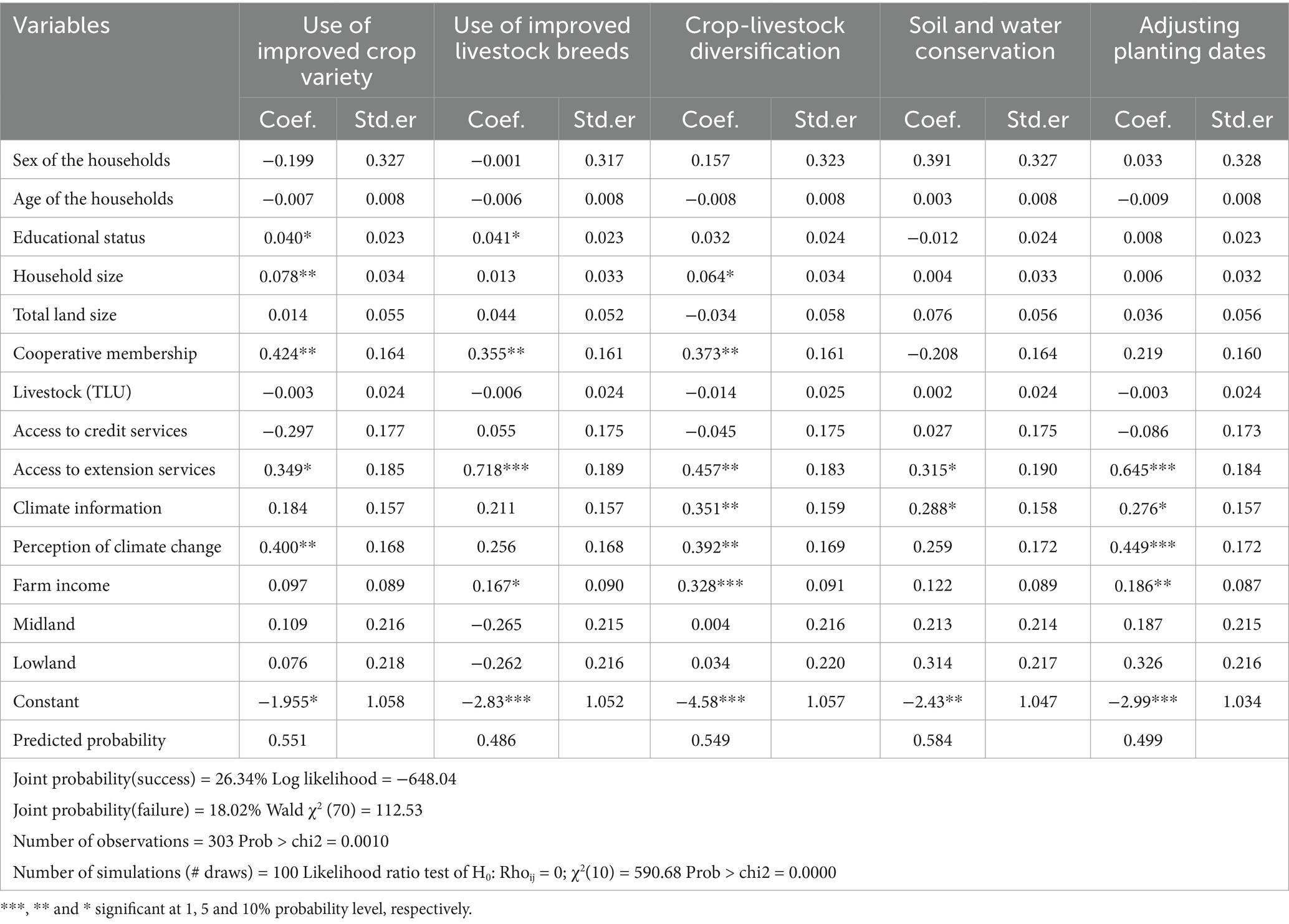
Table 6. Multivariate probit simulation results for smallholder farmers’ adaptation strategy to climate change.
The results of the correlation coefficients of the error terms show that there is complementarity (positive correlation) between different adaptation strategies being used by farmers. The results support the assumption of interdependence between the different adaptation options, which may be due to complementarity in the different adaptation options and other factors that affect the uptake of all the adaptation strategies. The maximum likelihood method of estimation results suggested that there was positive and significant interdependence between household decisions to adapt using those five adaptation strategies.
The model result indicated that education, household size, cooperative membership, access to extension services, climate information, perception of climate change, and farm income positively and significantly affected farmers choices of adaptation strategies at different levels of significance (Table 6). Thus, the significant variables were discussed as follows:
Education level of the household head: The formal years of education were positively and significantly influencing the use of improved crop varieties and improved livestock breeds at 10% significance levels. The coefficient results specified that a unit increase in years of education could possibly increase the likelihood of using improved crop varieties and improved livestock breeds by 4 and 4.1%, respectively (Table 6). This suggests that being educated would improve access to information and help farmers easily understand and analyze the situation better than less educated farmers. The result also shown that educational status increases farmer awareness about the consequences of climate change on agricultural productivity and the benefits of improved crop varieties to reduce the impact of climate change. Therefore, farmers with more years of schooling are more informed and more likely to adopt climate change adaptation practices than those with fewer years of schooling. This finding was similar to those of Belay et al. (2017), and Megabia et al. (2022) Assaye et al. (2020). They noted that higher levels of education are likely to enhance information access for farmers, leading to improved technology adoption and higher farm production and productivity.
Household size: As expected, household size has a significant impact on improved crop varieties and crop-livestock diversification at 5 and 10% significance levels, respectively. The coefficient results indicated that as a family size increases by one unit in a household, the probability of using crop varieties and crop-livestock diversification as adaptation strategies increases by 7.8 and 6.4%, respectively (Table 6). The more likely reason could be that a large household size is normally associated with a higher labor endowment, which would enable a household to accomplish various agricultural tasks. This finding is also in line with the results of Assaye et al. (2020) and Abdulai et al. (2023), who state that households with larger household sizes are expected to use different adaptation strategies.
Membership in cooperatives: The results revealed a positive and significant influence of cooperative membership on farmers’ use of improved crop varieties, improved livestock breeds, and crop-livestock diversification as adaptation strategies to climate change at 5% significance level. Keeping other variables constant, being a member of a cooperative enhances the likelihood of using improved crop varieties, improved livestock breeds, and crop-livestock diversification by 42.4, 35.5, and 37.3%, respectively, as climate adaptation strategies (Table 6). This implies that farmers who are members of agricultural cooperatives are more likely to use improved crop varieties, improved livestock breeds, and crop-livestock diversification practices to ameliorate the adverse effects of climate change. Moreover, farmers who belong to farmers’ cooperatives have better chances of sharing relevant information on climate change among themselves than their counterparts who do not belong to any farmer cooperatives. The positive impacts of cooperative memberships on the deployment of climate change adaptation strategies in this study are consistent with the results of Abdulai et al. (2023) and Mwinkom et al. (2021).
Access to extension services: The model results demonstrated that there was a positive and statistically significant association between access to extension services and all climate change adaptation practices (Table 6). The results also showed that households with access to extension services are more likely to use different adaptation strategies due to higher awareness. The possible reason is that farmers who get more extension services, like regular advice and information related to climate change, are more likely to use adaptation practices than those who do not have extension services. The findings of this study are also more likely to be in line with those of Megabia et al. (2022) and Zeleke et al. (2022) showed that extension services increase the chance of adopting different adaptation strategies in response to climate change.
Access to climate information: The results display that access to climate information has a positive and significant effect on farmers’ choice of adaptation strategies. This shows that farmers who have access to climate information are more likely to use mixed farming, soil and water conservation, and adjust planting dates by 35.1, 28.8, and 27.6%, respectively (Table 6). This suggests that gaining access to climate-related information improves the knowledge of farmers on how to adjust to climate change-related risks for better preparation before it causes adversity by diversifying their farming, soil and water conservation practices, and planting dates in response to climate change. According to FGDs, farmers acquired climatic information through radio, development agents, and other sources. This finding is also in line with the findings of Abdulai et al. (2023) and Ahmed et al. (2023).
Perception of climate change: The results displayed that farmers who perceived climate change were more likely to use improved crop varieties, crop-livestock diversification, and adjusting planting dates as adaptation strategies in response to climate change. The results show that households that perceive climate change as well can possibly increase the likelihood of adapting choices on the use of improved crop varieties, crop-livestock diversification, and adjusting planting dates by 40, 39.2, and 44.9%, respectively (Table 6), keeping all other variables constant. This implies that as the farmers recognize climate change and its influence, they can use different adaptation practices against it in the study area. A study by Nyang'au et al. (2021) and Ahmed et al. (2023) found similar results.
Annual farm income of the household: The farm income of the household has a positive and significant impact on improved livestock breeds, mixed farming, and adjusting planting dates at 10, 1, and 5% significance levels, respectively (Table 6). Alternatively, farmers with large annual farm incomes are more likely to adopt improved livestock, mix farming, and adjust planting dates than those with lower annual incomes. This could be apparent because the use of improved livestock breeds, diversifying crops and livestock, and adjusting planting dates requires financial resources. These results are consistent with previous studies by Belay (2020) and Atube et al. (2021).
Conclusion
The study intended to explore farmers’ adaptation strategies to climate change in the Arsi zone, focusing on perceptions, constraints, and factors affecting their choices. Data was collected from 303 households and analyzed using descriptive statistics, Likert scale measurement, Mann–Kendall statistical test, weighted average index, and multivariate probit model. Farmers are facing decreased rainfall patterns and increased temperatures, which are affecting agricultural production. To mitigate climate change, they have been using adaptation strategies like improved seeds, livestock, mixed farming, soil and water conservation, and shift in planting dates. Also, among the crop adaptation strategies, crop rotation was the first most important adaptation strategy commonly used, followed by drought-tolerant crops and mulching for crop-based adaptation strategies against climate change, respectively. Similarly, diversification of livestock types is the most preferred livestock adaptation strategy. However, lack of inputs, shortage of capital, high prices of inputs, limited grazing land, poor technical knowledge, lack of improved livestock, and lack of climate information were the major constraints in the study area. The MVP model reveals that education, household size, cooperative membership, extension services, climate information, perception of climate change, and farm income significantly affect farmers’ choices of adaptation strategies. The study aims to inform policymakers and extension workers on farm-level adaptation strategies to lessen climate change’s adverse effects, promoting agricultural and economic development, and requiring suitable policy formulation and implementation.
Recommendations
The research findings found that concerned bodies have to work on the development agents’ knowledge by continually updating the extension workers’ knowledge so as to improve the productivity and production level of agricultural production (both crop and livestock) through the transfer of improved technologies, knowledge, and practices that are ecologically, socially, and economically feasible. Generally, governments, policymakers, and researchers should focus on raising awareness about climate change through different sources, such as mass media, extension services, facilitating agricultural cooperative unions to obtain inputs, enhancing research on the use of crop varieties, improving livestock breeds that are more suited to the local environment, improving farmers farm income earning opportunities, and improving literacy status, which would do the most to accelerate adaptation and increase households’ decision-making regarding key adaptation practices.
Limitations of the study and future work
The major limitation of this study is that it identified only five major adaptation strategies in the model. However, there are a large number of adaptation measures that could be taken by smallholder farmers in the area. Another limitation of this study is the use of cross-sectional data and its focus only on three districts, and the sample size was also not large because of financial and time constraints. Moreover, this study did not consider the impact of each adaptation strategy. Thus, the researcher recommends that future policy and research should focus on evaluating the impacts of each adaptation strategy on the livelihood of smallholder farmers to build their adaptive capacity and their resilience.
Data availability statement
The original contributions presented in the study are included in the article/supplementary material, further inquiries can be directed to the corresponding author.
Ethics statement
Ethical review and approval were not required for the study on human participants in accordance with local legislation and institutional requirements. Written informed consent for participation was not required for this study in accordance with the national legislation and the institutional requirements.
Author contributions
ID: Conceptualization, Data curation, Formal analysis, Investigation, Methodology, Resources, Software, Supervision, Writing – original draft, Writing – review & editing. EB: Data curation, Investigation, Methodology, Project administration, Supervision, Visualization, Writing – review & editing.
Funding
The author(s) declare that no financial support was received for the research, authorship, and/or publication of this article.
Acknowledgments
The authors would like to express their sincere gratitude to the Oromia Agricultural Research Institute and the Asella Agricultural Research Center for providing the financial support. Thanks to the interviewees, the enumerators, and Arsi zone Agriculture Office.
Conflict of interest
The authors declare that the research was conducted in the absence of any commercial or financial relationships that could be construed as a potential conflict of interest.
Publisher’s note
All claims expressed in this article are solely those of the authors and do not necessarily represent those of their affiliated organizations, or those of the publisher, the editors and the reviewers. Any product that may be evaluated in this article, or claim that may be made by its manufacturer, is not guaranteed or endorsed by the publisher.
References
Abazinab, H., Duguma, B., and Muleta, E. (2022). Livestock farmers' perception of climate change and adaptation strategies in the Gera district, Jimma zone, Oromia regional state, Southwest Ethiopia. Heliyon 8:e12200. doi: 10.1016/j.heliyon.2022.e12200
Abdulai, A. M., Sulemana, M., and Ayambila, S. N. (2023). Smallholder farmer adaptation strategies to climate change in northern Ghana: evidence from Gushegu. IJFMR 5, 1–16.
Adger, W. N., Lorenzoni, I., and O'Brien, K. L. (2009). Adapting to climate change: Thresholds, values, governance. first Edn. Cambridge, UK: Cambridge University Press.
AGRA (Alliance for a Green Revolution in Africa) (2018). Africa agriculture status report: The business of smallholder agriculture in sub-Saharan Africa. Alliance Green Revolut Afr AGRA, 5, 3–19.
Ahmed, B., Haji, J., Ketema, M., and Jemal, K. (2023). Impacts and adaptation extents of climate smart agricultural practices among smallholder farmers of Ethiopia: implication to food and nutrition security. Cogent Eco & Finance 11:2210911. doi: 10.1080/23322039.2023.2210911
Asrat, P., and Simane, B. (2018). Farmers’ perception of climate change and adaptation strategies in the Dabus watershed, North-West Ethiopia. Ecol. Process. 7, 1–13. doi: 10.1186/s13717-018-0118-8
Assaye, A., Ketema, M., and Bekele, A. (2020). Smallholder farmers’ adaptation strategies to climate change: the case of Ankesha Guagusa District of Awi zone, northwestern Ethiopia. J Agric Econom Rural Develop 6, 760–772.
Atube, F., Malinga, G. M., Nyeko, M., Okello, D. M., Alarakol, S. P., and Okello-Uma, I. (2021). Determinants of smallholder farmers’ adaptation strategies to the effects of climate change: evidence from northern Uganda. A Food Secur 10, 1–14. doi: 10.1186/s40066-020-00279-1
Ayal, D. Y., and Filho, W. L. (2017). Farmers’ perceptions of climate variability and its adverse impacts on crop and livestock production in Ethiopia. J of Arid Envints 140, 20–28. doi: 10.1016/j.jaridenv.2017.01.007
Belay, A. Determinants of farmers’ choices of adaptation strategies to climate change: The case of Guangua District of Awi zone, Amhara National Regional State, Northwestern Ethiopia. MSc Thesis, Haramaya University, Ethiopia. (2020).
Belay, A., Recha, J. W., Woldeamanuel, T., and Morton, J. F. (2017). Smallholder farmers’ adaptation to climate change and determinants of their adaptation decisions in the central Rift Valley of Ethiopia. Agri & Food Security 6, 1–13. doi: 10.1186/s40066-017-0100-1
Belderbos, R., Carree, M., Diederen, B., Lokshin, B., and Veugelers, R. (2004). Heterogeneity in R&D cooperation strategies. Int. J of industrial orgn 22, 1237–1263. doi: 10.1016/j.ijindorg.2004.08.001
Bewket, W., Radeny, M., and Mungai, C. (2015). Agricultural adaptation and institutional responses to climate change vulnerability in Ethiopia. CCAFS working paper. 106:60.
Deressa, T. T., Hassan, R. M., Ringler, C., Alemu, T., and Yesuf, M. (2009). Determinants of farmers’ choice of adaptation methods to climate change in the Nile Basin of Ethiopia. Glob. Environ. Chang. 19, 248–255. doi: 10.1016/j.gloenvcha.2009.01.002
Evariste, F. F., Jean, S. D., Victor, K., and Claudia, M. (2018). Assessing climate change vulnerability and local adaptation strategies in adjacent communities of the KribiCampo coastal ecosystems. South Cameroon. Urb Climate 24, 1037–1051. doi: 10.1016/j.uclim.2017.12.007
Fadina, A. M. R., and Barjolle, D. (2018). Farmers’ adaptation strategies to climate change and their implications in the Zou Department of South Benin. Envirnts 5, 15–25. doi: 10.3390/environments5010015(Federal Democratic Republic of Ethiopia).
FAO (Federal Democratic Republic of Ethiopia). (2019). The state of food insecurity in the world. Rome, Italy: FAO.
FDRE. (2011). Ethiopia’s climate-resilient green economy strategy (CRGE). Addis Ababa. Ethiopia. cmpethiopia.org.
IPCC. (2014). “Climate change 2014: Impacts, adaptation, and vulnerability. Part a: Global and sectoral aspects.” Contribution of working group II to the fifth assessment report of the IPCC university press, Cambridge, United Kingdom and New York, NY, USA, 1132.
Kasim, M., and Feto, A. (2018). Determinants of smallholder farmers’ adaptation to climate change and variability: the case study of Sire District, Arsi zone, Oromia National Regional State, Ethiopia. Arsi J. Sci. Innovation 3, 1–41.
Kosec, K., and Mo, C. H. (2017). Aspirations and the role of social protection: evidence from a natural disaster in rural Pakistan. World Dev. 97, 49–66. doi: 10.1016/j.worlddev.2017.03.039
Kosgey, I. S. (2004). Breeding objectives and breeding strategies for small ruminants in the tropics : Wageningen University and Research.
Lin, C. T. J., Jensen, K. L., and Yen, S. T. (2005). Awareness of foodborne pathogens among US consumers. Food Qual. Prefer. 16, 401–412. doi: 10.1016/j.foodqual.2004.07.001
Lomiso, T. F. (2020). Climate change, its effect on livestock production and adaptation strategies in Hawassa zuria and hula districts of Sidama region, Ethiopia. I.J.E. Mit. Anal 8, 117–129.
Megabia, T. T., Amare, Z. Y., and Asmare, A. M. (2022). Rural household perception and adaptation strategies to climate change and variability: in the case of Libo-kemkem Woreda. Ethiopia. Envtl Sys Res. 11, 1–10. doi: 10.1186/s40068-022-00270-8
Mwinkom, F. X., Damnyag, L., Abugre, S., and Alhassan, S. (2021). Factors influencing climate change adaptation strategies in North-Western Ghana: evidence of farmers in the black Volta Basin in upper west region. Discover applied sci. 3, 1–20. doi: 10.1007/s42452-021-04503-w
Nyang'au, J. O., Mohamed, J. H., Mango, N., Makate, C., and Wangeci, A. N. (2021). Smallholder farmers’ perception of climate change and adoption of climate smart agriculture practices in Masaba south sub-county, Kisii, Kenya. Heliyon 7:e06789. doi: 10.1016/j.heliyon.2021.e06789
Oloo, G.I. Evaluation of climate change adaptation strategies and their effect on food production among farmers in Bungoma County, Kenya. PhD Dissertation, Egerton University, Kenya. (2013).
Serdeczny, O., Adams, S., Baarsch, F., Coumou, D., Robinson, A., Hare, W., et al. (2017). Climate change impacts in sub-Saharan Africa: from physical changes to their social repercussions. Reg. Environ. Chang. 17, 1585–1600. doi: 10.1007/s10113-015-0910-2
Shiferaw, A. (2014). Smallholder farmers’ adaptation strategies to climate change in Ethiopia: evidence from Adola Rede Woreda, Oromia region. J Eco Sust Devpt 5, 162–182.
Tanto, T., and Laekemariam, F. (2019). Impacts of soil and water conservation practices on soil property and wheat productivity in southern Ethiopia. Envtal Sys Research 8, 1–9. doi: 10.1186/s40068-019-0142-4
Tesfaye, W., and Seifu, L. (2016). Climate change perception and choice of adaptation strategies: empirical evidence from smallholder farmers in East Ethiopia. Int. J. Climate Change Strat. Manag. 8, 253–270. doi: 10.1108/IJCCSM-01-2014-0017
Workalemahu, S., and Dawid, I. (2021). Smallholder farmers’ adaptation strategies, opportunities, and challenges to climate change: a review. Int J Food Sci Agric 5, 592–600. doi: 10.26855/ijfsa.2021.12.005
Zeleke, T., Beyene, F., Deressa, T., Yousuf, J., and Kebede, T. (2022). Smallholder farmers' perception of climate change and choice of adaptation strategies in east Hararghe zone, Eastern Ethiopia. IJCCSM 15, 515–536. doi: 10.1108/IJCCSM-01-2022-0014
Keywords: adaptation strategies, climate change, farmers, Ethiopia, multivariate probit
Citation: Dawid I and Boka E (2025) Farmers’ adaptation strategies to climate change on agricultural production in Arsi zone, Oromia National Regional State of Ethiopia. Front. Clim. 7:1447783. doi: 10.3389/fclim.2025.1447783
Edited by:
Benedicta Essel Ayamba, Council for Scientific and Industrial Research (CSIR), GhanaReviewed by:
Rajiv Kumar Srivastava, Texas A&M University, United StatesTagesse Melketo, Wolaita Sodo University, Ethiopia
Ahsan Naseem, Ghent University, Belgium
Copyright © 2025 Dawid and Boka. This is an open-access article distributed under the terms of the Creative Commons Attribution License (CC BY). The use, distribution or reproduction in other forums is permitted, provided the original author(s) and the copyright owner(s) are credited and that the original publication in this journal is cited, in accordance with accepted academic practice. No use, distribution or reproduction is permitted which does not comply with these terms.
*Correspondence: Ibsa Dawid, ZGF3aWRpYnNhMzNAZ21haWwuY29t
 Ibsa Dawid
Ibsa Dawid Ephrem Boka
Ephrem Boka